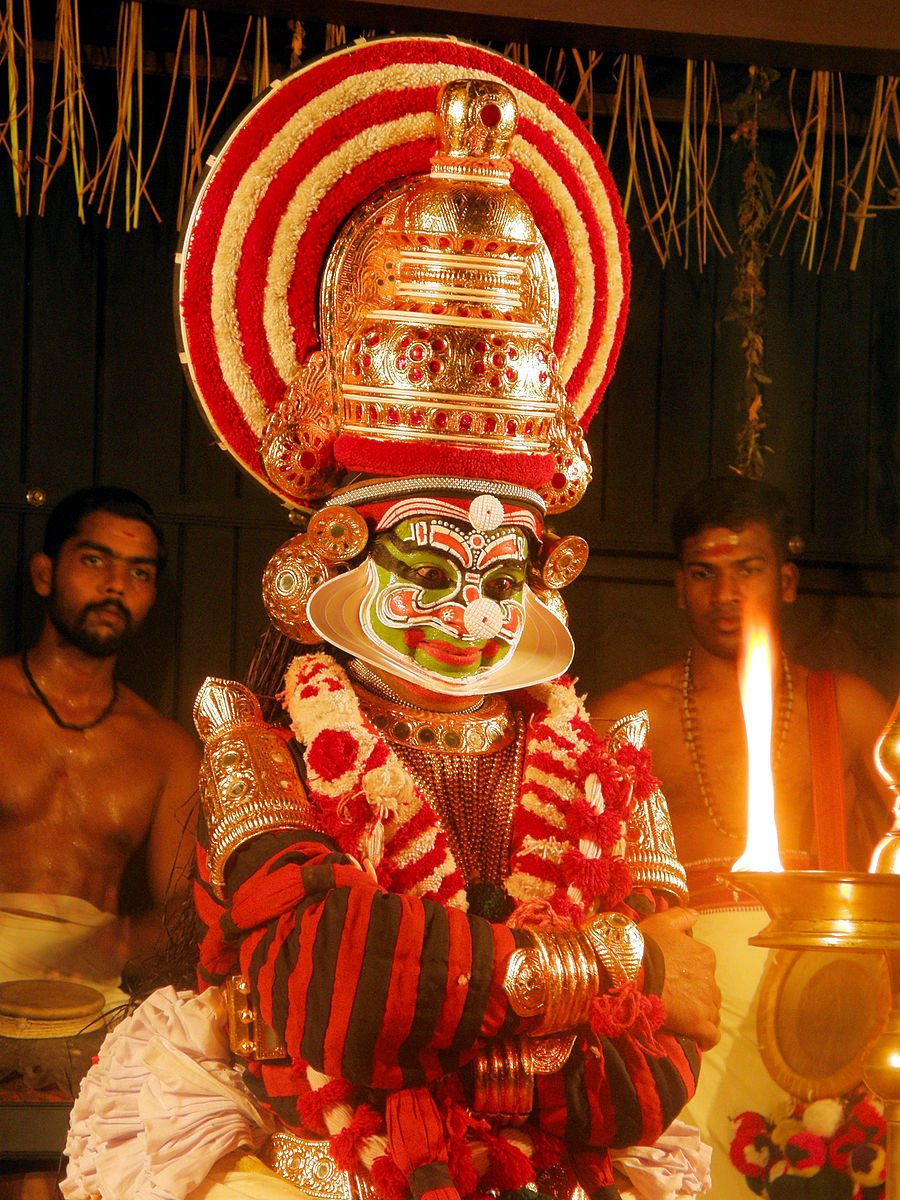Pharaoh Sends Love
Chakyar Margi Mahdu as Ravana in the Asokavanikangam. Photo by Ranjith S
Dear friends,
It has been fifteen years since I began obsessing over Pharaoh. It began in a tiny village in the south of India, a lush, tropical heaven by a river, where I had come to watch a play. It was a little longer than most plays I had seen with a run time of just over two weeks. Every evening we would gather at the Kuttambalam, a small, roofed open air theater a couple minutes walk from the temple. The drummers would take their seat atop the giant mizhavu drums, a conch horn was blown, and the actor would appear onstage, in the elaborate costume and make up of the ten-headed demon king, Ravana. That is when the improvisation would begin. Using the unique sign language of the Kudiyatam theatrical tradition, he would remind us what happened yesterday, and then enact for us the next piece of the story, complete with hours-long diversions to paint the full picture of the associations and memories the story evokes in Ravana’s gorgeous mind. It might go on four hours. Usually a bit less, sometimes more.
The play was called the Asokavanikangam, or Asoka Tree Garden, and told of the time when Ravana kidnapped the goddess Sita, wife of Rama, and did everything he could think of to convince her to sleep with him. It didn’t work. Ravana was thrown into a crisis. Never before had he been prevented from accomplishing a task, fulfilling a desire. Several times during the course of the play he recalls the time when his charioteer told him they would have to travel around Mount Everest (called Kailasa in the play), because it’s too high to go over. Ravana refused to accept this indignity. He steps off the chariot, and though it might take him half an hour of stage time he eventually succeeds in picking up the mountain and moving it aside (not before some agile juggling). Now, however, he is faced with an obstacle he cannot surpass, in the form of Sita’s pure devotion to her husband.
Over the fifteen nights of the play we watched Ravana lose his powerful, charismatic self to the experience of limitation. While he would sit sadly on the floor reckoning with his inability and his tremendous lust, the theater would be visited by fruit bats, who would fly in and flatten themselves against the ripening bananas decorating each side of the stage.
This is what religion is meant to be. An encounter with human creativity, with joint brokenness, with the interconnected depths of good and evil, with the inconceivable beauty of life.
I came out of that experience with two convictions, one conscious and the other not yet. Consciously I decided to write a play that would offer the gift of falling in love with a mythical villain to a Western audience. A few days later I landed on the great enemy of the Hebrews, symbol of ego, stubbornness and cruelty to all three major monotheistic faiths, Pharaoh. The next day I arrived at the central temple of the great ancient Tamil city of Tanjavur. After offering gifts and prayers to the god Siva and his bull Nandi, I parked myself with a notebook in a corner of the temple, and out came the first scene, where Pharaoh battles Death, and wins.
Since then I have been spending far too much time with my beloved Pharaoh. I have learned of his genius, his relationships with his wife, daughter and son, his blind spots and his prophetic wisdom. I gained insight into the theological-political duel between him and Moses. I have come to see the destructiveness in the flat story of good and evil that our tradition attempts to maintain. And I’ve encountered through him my own hints of divinity, and my deep, human limitations.
After a path I could have never imagined, the play is set to open in a few weeks, with a South Indian master of Kathakali - the faster paced dance theater sibling of Kudiyatam - in the lead role, who will be dressed in the same costume and make up as Ravana was in that play I saw all those years ago. I’ll tell you more about this incredible actor and maybe more about the theological battle at the heart of the play in the coming weeks. And hopefully about that unconscious conviction I mentioned earlier as well. It’s rare for a playwright to have an opportunity to lay out the story of writing the play, and the ideas they are working out in them. I’m excited to take these next few weeks until the opening to dig into some of the driving questions behind my rabbinical and theatrical path, as they found expression in the writing, acting and production of Pharaoh.
For now I wish you a peaceful Shabbat. Pharaoh sends his love. Might it be time to open your heart to him?
Shabbat shalom,
Rabbi Misha

